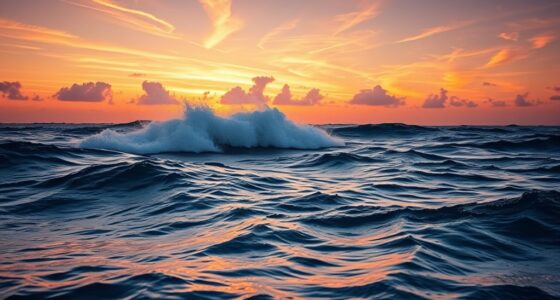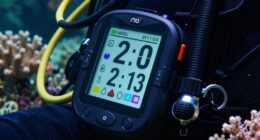Many believe that drinking seawater can quench thirst or help in emergencies, but it’s actually a dangerous myth. Seawater’s high salt content worsens dehydration by drawing water out of your cells and increasing kidney workload to excrete excess salt. Instead, it depletes your body’s fluids and electrolytes, making symptoms worse. If you keep going, you’ll discover the real facts about hydration and how to stay safe in survival situations.
Key Takeaways
- Drinking seawater worsens dehydration by increasing salt levels, causing cells to lose water.
- The kidneys struggle to excrete excess salt from seawater, leading to further fluid loss.
- Seawater intake accelerates dehydration symptoms, not alleviates them, posing health risks.
- Proper hydration requires freshwater or electrolyte solutions, not seawater.
- Myths suggesting seawater can hydrate or sustain survival are false; it harms the body’s fluid balance.

Many people believe that drinking seawater can help hydrate the body, but in reality, it can do more harm than good. When you ingest seawater, you’re consuming a solution with a much higher salt concentration than your body’s fluids. This disrupts your electrolyte balance, making it harder for your body to maintain proper hydration. Instead of replenishing lost fluids, seawater causes your cells to lose water, worsening dehydration rather than alleviating it. This is because your body attempts to dilute the excess salt, pulling water from your tissues and bloodstream. As a result, you face increased dehydration risks, which can lead to symptoms like dizziness, weakness, and confusion.
Your kidneys are designed to filter out excess salt, but they can only handle so much at once. Drinking seawater forces them to work overtime to excrete the surplus salt, which requires more water. This process actually depletes your body’s water reserves, making dehydration worse. If you’re in a survival situation or trying to avoid dehydration, drinking seawater is counterproductive. It can accelerate fluid loss, intensifying symptoms like dry mouth, rapid heartbeat, and decreased urine output. The more seawater you drink, the more your body struggles to restore its electrolyte balance, risking severe dehydration and even organ failure if the situation persists. Additionally, myelination, which is essential for efficient neural communication, can be negatively impacted by dehydration and electrolyte imbalances, further impairing cognitive and motor functions.
Understanding dehydration risks is essential, especially in outdoor or emergency scenarios. You might think that any water source is better than none, but seawater is a prime example of how not all fluids are beneficial. Instead of helping, seawater aggravates dehydration by drawing water out of your cells. To stay properly hydrated, you need water with a balanced electrolyte composition—something seawater lacks. Drinking freshwater or electrolyte solutions restores your body’s electrolyte balance, allowing your cells to function correctly and aiding in rehydration.
Frequently Asked Questions
Can Drinking Seawater Cause Dehydration?
Yes, drinking seawater can cause dehydration because the high osmotic pressure draws water out of your cells. When you consume seawater, the excess salt leads to a mineral imbalance, making it harder for your body to retain water. This forces your kidneys to work harder to eliminate the salt, which actually worsens dehydration instead of relieving it. So, avoid drinking seawater if you want to stay properly hydrated.
Is Seawater Safe to Drink in Emergencies?
In emergencies, seawater isn’t safe to drink because of seawater contamination and high salt levels that can dehydrate you further. Think of desalination methods as your lifeline—filtering out salt and contaminants. Without proper treatment, drinking seawater is like pouring salt into an open wound. Always seek alternative water sources, and use desalination if possible, to stay safe and hydrated in critical moments.
How Does Seawater Affect Kidney Function?
Drinking seawater puts your kidneys under strain because of its high salt content. The excess salt causes an electrolyte imbalance, forcing your kidneys to work harder to filter out the salt and maintain balance. This increased workload can lead to dehydration, kidney stress, and potential damage over time. It’s best to avoid drinking seawater, especially in emergencies, to protect your kidney function and overall health.
Are There Any Benefits to Drinking Small Amounts of Seawater?
Drinking small amounts of seawater isn’t beneficial and can harm you. Some believe it boosts hydration, but hydration myths aside, seawater’s high mineral content, especially salt, can dehydrate you instead of helping. Your body needs fresh water to stay properly hydrated. Instead of risking your health with seawater, focus on drinking clean, fresh water to meet your hydration needs safely.
What Are the Long-Term Health Effects of Seawater Consumption?
Drinking seawater long-term can wreak havoc on your health, like inviting chaos into your body. It can cause severe electrolyte imbalance, leading to dehydration, muscle cramps, and confusion. Over time, mineral toxicity may develop, damaging your organs. Your body isn’t built to handle the high salt content, so persistent seawater consumption risks serious health issues that could last a lifetime. Avoid it to protect your well-being and stay safe.
Conclusion
Remember, seawater isn’t your rescue raft in survival situations—it’s more like quicksand for your body. Believing myths about its safety can drown you in trouble. Instead, see facts like shining beacons guiding you to better choices. Keep your understanding clear and your body hydrated with safe, fresh water. Think of seawater myths and facts as a lighthouse—guiding you away from rocky shores and toward safe waters, ensuring you stay afloat and healthy.









